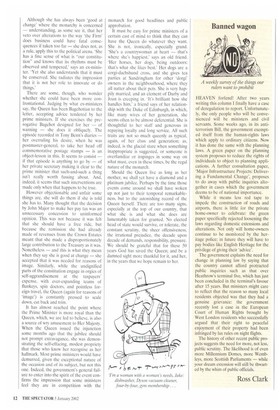Banned wagon
A weekly survey of the things our rulers want to prohibit
HEAVEN forfend! After two years writing this column I finally have a case of deregulation to report. Unfortunately, the only people who will be convenienced will be ministers and civil servants. Some weeks ago, in its antiterrorism Bill, the government exempted itself from the human-rights laws which apply to ordinary citizens. Now it has done the same with the planning laws. A green paper on the planning system proposes to reduce the rights of individuals to object to planning applications. A further consultation paper, 'Major Infrastructure Projects: Delivering a Fundamental Change', proposes to do away with public inquiries altogether in cases which the government deems to be of national importance.
While it means less red tape to impede the construction of roads and airports, there is little for the private home-owner to celebrate: the green paper specifically rejected loosening the laws regarding domestic extensions and alterations. Not only will home-owners continue to be monitored by the heritage police; in future they will have to pay bodies like English Heritage for the privilege of giving their 'advice'.
The government explains the need for change in planning law by saying that the country cannot afford protracted public inquiries such as that over Heathrow's terminal five, which has just been concluded in the terminal's favour after 15 years. But ministers might care to reflect that the reason so many local residents objected was that they had a genuine grievance: the government recently lost a case in the European Court of Human Rights brought by West London residents who successfully argued that their right to peaceful enjoyment of their property had been infringed by lax rules on night flights.
The history of other recent public projects suggests the need for more, not less, public scrutiny. The likelihood is of even more Millennium Domes, more Wernbleys, more Scottish Parliaments — while your dream extension will still be thwarted by the whim of public officials.
Ross Clark






















































 Previous page
Previous page